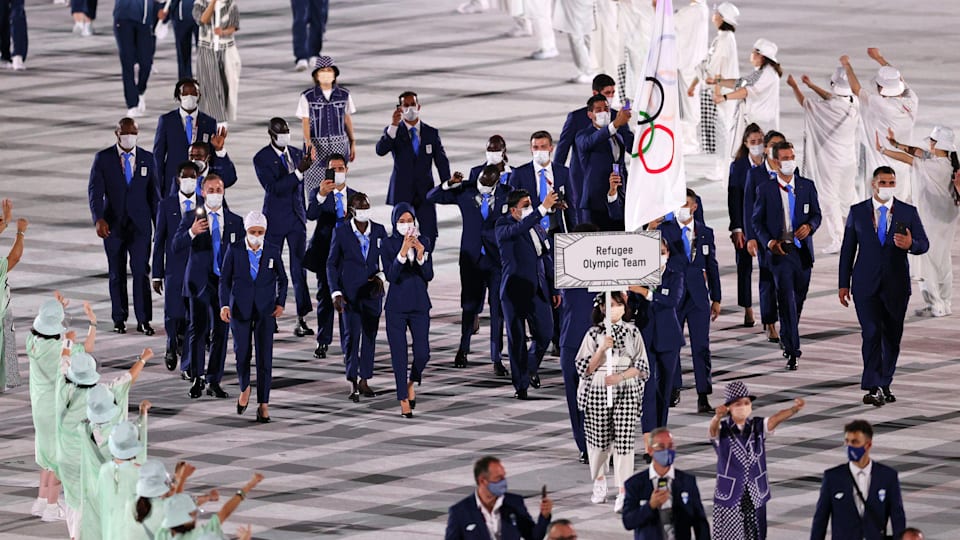IOC Refugee Olympic Team: What has been its global impact? Watch Paris 2024 team announcement for free

This week, the members of the IOC Refugee Olympic Team Paris 2024 will be announced in a ceremony on Thursday (2 May) at 1pm CEST (11am UTC).
The team, which made its debut at the Olympic Games Rio 2016 and returned at the Olympic Games Tokyo 2020, is preparing for its third outing at an Olympic Games at this summer's Olympic Games Paris 2024.
This year, its cheffe de mission will be Masomah Ali Zada, herself a member of the IOC Refugee Olympic Team Tokyo 2020. The team's composition will be decided by the IOC Executive Board, considering each athlete’s sporting performance. Balanced representation in terms of sport, gender and regions will also be taken into consideration.
You can tune in to the announcement on Thursday live through the IOC Media YouTube, or through the video embedded below.
But what has the impact been of the IOC Refugee Olympic Team since its formation in 2015?
What is the IOC Refugee Olympic Team and how did it start?
The IOC Refugee Olympic Team and its athletes are a symbol of hope for refugees worldwide, serving to increase global knowledge and attention of the scale of the international refugee crisis.
The first team was originally announced in October 2015 by International Olympic Committee President Thomas Bach. In March 2016, the IOC Executive Board agreed to create the team to provide potential elite athletes, who were affected by the refugee crisis, a chance to qualify for and participate at the Olympic Games.
In 2016, after the IOC Executive Board approved the team's creation, a final list of 10 athletes was selected to take part at the Olympic Games in Rio. Following this historic participation, Olympic Scholarships for Refugee Athletes were established.
These scholarships, fully funded by the IOC through Olympic Solidarity and administered by the Olympic Refuge Foundation, help refugee athletes train and adapt in their host countries. At Tokyo 2020, 29 Scholarship-holders were selected for the team.
At Tokyo 2020, the IOC Refugee Olympic Team took on the French acronym EOR (équipe olympique des réfugiés), which it will use again in Paris.
All athletes on the prior two teams, as well as the team for Paris 2024, had or have received UN refugee status.
What impact and recognition has the IOC Refugee Olympic Team had?
Successful performances from the EOR athletes has generated increased attention, and has even resulted in big-screen retellings. For example, the story of Yusra Mardini's escape from Syria and resettlement in Germany was even made into a biographical drama film called The Swimmers.
And in 2023, Oscar-nominated director Waad al-Kateab oversaw the documentary film We Dare to Dream, which followed refugee athletes on their individual journeys to Tokyo 2020.
In 2022, the IOC Refugee Olympic Team and the Olympic Refuge Foundation were recognised for their work in providing opportunities for young displaced people around the world to access sport and thrive in all aspects of their lives at the prestigious Premios Princesa de Asturias, awarded by Spain's Princess of Asturias Foundation.
The EOR and ORF won the Princess of Asturias Award for Sport, with HRH Leonor, Princess of Asturias, saying at the time: "It is such a great initiative that, thanks to the Refugee Olympic Team and the Olympic Refuge Foundation, athletes in this situation have had the opportunity for some years now to continue their pursuits in order to compete in the Olympic Games."
While no IOC Refugee Olympic Team athlete has yet won a medal at the Olympic Games, some have come close. At Tokyo 2020, taekwondo athlete Kimia Alizadeh reached the bronze-medal bouts but was defeated at the last hurdle, finishing joint-fifth.
Earlier this year, she secured a Paris 2024 quota spot on merit as a refugee athlete at the European Qualification Tournament, although she has since received Bulgarian citizenship, which marked the end of her refugee journey.